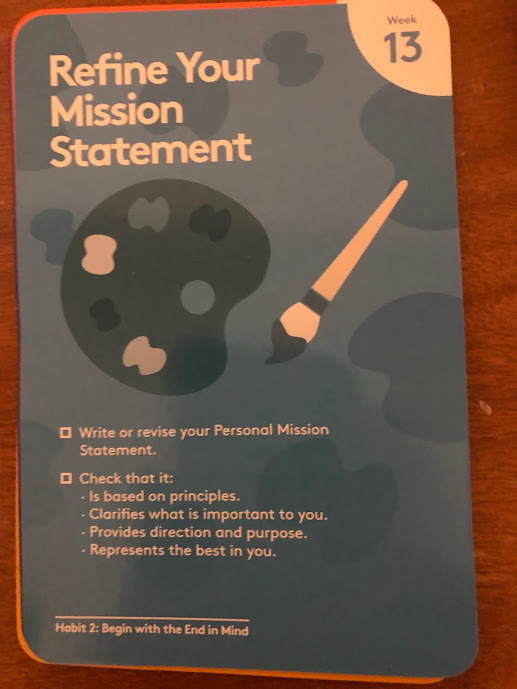Mission Statement
But let's give it a shot.
Prayer of St. Francis (perhaps his "Mission Statment")
Lord, make me an instrument of Your peace;
Where there is hatred, let me sow love;
Where there is injury, pardon;
Where there is doubt, faith;
Where there is despair, hope;
Where there is darkness, light;
And where there is sadness, joy.
O Divine Master,
Grant that I may not so much seek
To be consoled as to console;
To be understood, as to understand;
To be loved, as to love;
For it is in giving that we receive,
It is in pardoning that we are pardoned,
And it is in dying that we are born to Eternal Life.
Amen.
You could think of this as a prayer or a "promise to yourself". I'm not hoping for "Eternal Life". The whole plan looks good without that. Good start.
1 Cor 13 has always been important to me:
3 If I speak in the tongues[a] of men or of angels, but do not have love, I am only a resounding gong or a clanging cymbal.
2 If I have the gift of prophecy and can fathom all mysteries and all knowledge, and if I have a faith that can move mountains, but do not have love, I am nothing.
3 If I give all I possess to the poor and give over my body to hardship that I may boast,[b] but do not have love, I gain nothing.
4 Love is patient, love is kind. It does not envy, it does not boast, it is not proud.
5 It does not dishonor others, it is not self-seeking, it is not easily angered, it keeps no record of wrongs.
6 Love does not delight in evil but rejoices with the truth.
7 It always protects, always trusts, always hopes, always perseveres.
8 Love never fails.
But where there are prophecies, they will cease; where there are tongues, they will be stilled; where there is knowledge, it will pass away.
9 For we know in part and we prophesy in part, 10 but when completeness comes, what is in part disappears.
11 When I was a child, I talked like a child, I thought like a child, I reasoned like a child. When I became a man, I put the ways of childhood behind me.
12 For now we see only a reflection as in a mirror; then we shall see face to face. Now I know in part; then I shall know fully, even as I am fully known.
13 And now these three remain faith, hope, and love. But the greatest of these is love.
Again, we can strip the metaphysical content of this message and swill wind up with a solid definition of "love", which is, in many ways, quite different from what many people think of as "love". Even so, it has been the working definition that has kept my marriage together since I contracted Christianity. The definition survived after I was cured of Christianity and long into my convalescence.
Taken together, these two passages seem to represent the best of my "mission in life". They are not new to me - they have guided me for at least 40 years and there is good reason to think that they fell on "fertile ground".
What is missing from these statements is some kind of resolve as to my personal goals (such as health, wisdom, enjoyment of life). This bears thought. There are some old canards such as "being all you can be" and "self-actualization" that I have long rejected as core to my "mission in life", but are nonetheless important secondary or supporting goals. From these goals comes my re-visit of the Covey system in the first place. Perhaps one might add:
Life is short. Don't piss it away.
In 1 Cor 13, I also see buried an element of personal humility. We see things darkly. But, with humility, we should also try to see things as clearly as we can. To think like grown-ups. In the service of this goal, I think of the Mindful definition of Wisdom and Hofstader's definition of intelligence.
Mindfulness demands that we see situations from all angles in all their individual complexity, stripped of our personal interests and prejudice.
Intelligence demands the skillful use of analogy (the fuel of thinking), which entails recognition of unhelpful analogy and the broadening of the situations fruitful for analogy.
-----------
All of the above has been in the back of my mind for days after I wrote it. While reading "Uncle Tom's Cabin" for the incredible 2nd time, I ran across:
And the King shall answer and say unto them, Verily I say unto you, Inasmuch as ye have done it unto one of the least of these my brethren, ye have done it unto me.
Even in my "Christian" days, I never regarded heaven or schemes to get into it as anything but childish fantasy, nor the related "God in the sky" image (Santa for grownups), but these words have always moved me. This is how I have always seen the "least of these". I very often say to myself, There but for the grace of God, go I. It so happens that I have occasionally experienced a sudden and unexpected entry into the world of the least fortunate (due to my bipolar illness).
There is no point in analyzing or over-thinking these influences. The task at hand is to identify the influences, not "explain" them.




Comments
Post a Comment